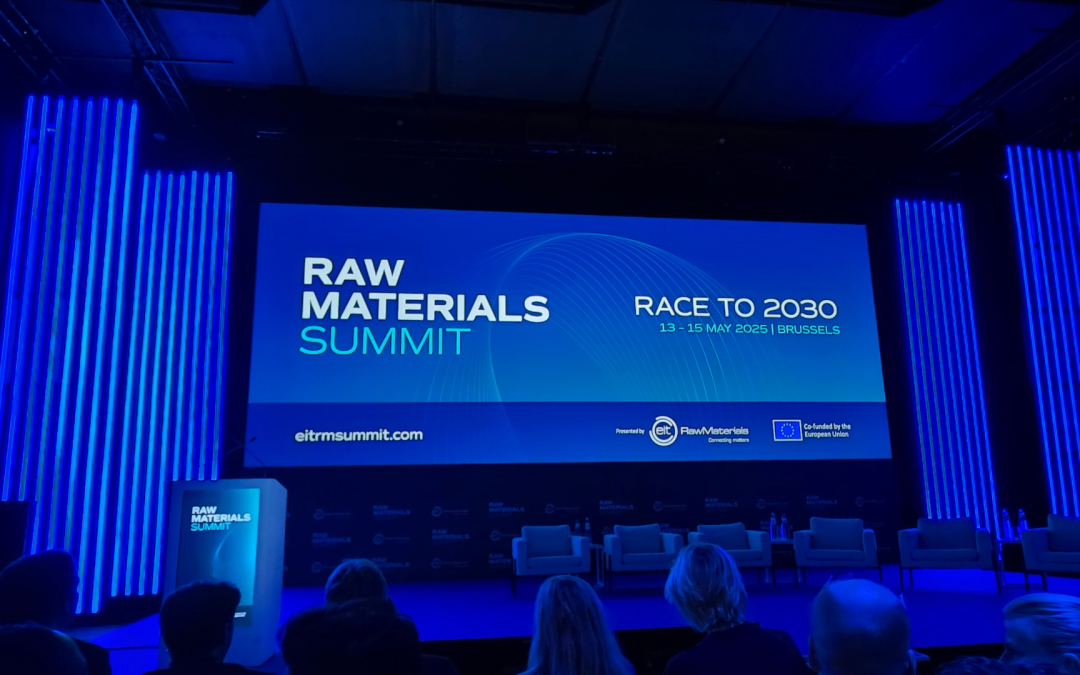Europe currently recycles less than 1% of its rare earth elements, despite these critical materials being essential to produce a wide array of electronic and automotive products, as well as for the advancement of sustainable technologies (1). Similarly, The EU’s Waste of Electrical and Electronic Equipment collection rate (40.6%) remains well below the 65% target (2).
“Critical raw materials (CRMs) are no longer just an industry concern, they are essential to Europe’s competitiveness, strategic autonomy, and green transition.” EIT Raw Materials
On May 14th & 15th, the 7th EIT Raw Materials Summit, titled “Race to 2030”, took place in Brussels, allowing for the exploration of critical dimensions ranging from circular economy to industrial investment, geopolitical risks, and innovation-driven competitiveness. Gathering key stakeholders from EU institutions, industry, academia, and international organizations, Pedro Dias from INESC TEC, iBot4CRMs partner, also joined the event.

As Europe pushes toward resilience, autonomy, and sustainability in the raw materials sector, the discussions that took place during the sessions were constructive. They included some of the following takeaways:
1. Much like iBot4CRM’s commitment to placing circularity at its core, experts all agreed that circularity is key to achieving critical raw material supply resilience, climate neutrality, and a competitive edge. In particular, strategic emphasis should be placed on increasing recycled content, improving traceability, and designing for disassembly to effectively close material loops. Among the solutions discussed, enhancing support for startups and scale-ups working on recycling technologies was especially highlighted.
2. Battery production and market competitiveness were highlighted as another critical dimension, with strategic emphasis on investments in recycling and the development of cutting-edge technologies, including AI-driven resource optimization.
3. To ensure sustainable material sourcing, reliance on limited and remote regions of the world must be reduced. Key enablers of this shift include the use of substitute materials and the promotion of recovery through urban mining.
4. To increase supply chain resilience, cross-border cooperation must take place, to mitigate logistical bottlenecks.
5. Rather than out-mine, we should choose to out-innovate. To invest in industrial capacity and technological advancement, support needs to be brought to Research and Development, the scaling up of solutions and commercialization.
6. For industrial growth, policy and regulatory frameworks, including clear targets, need to be set, and tied with financial and legal accountability.

Between sessions, numerous conversations with innovators and startups provided valuable opportunities to discuss iBot4CRM’s ambitious solutions, their potential to improve recovery rates, reduce environmental impact, and pave the way for a new approach to critical raw materials (CRM) recovery, while also acknowledging the challenges ahead. The enthusiasm surrounding iBot4CRM reflects a broader shift and a promising future for collaboration across all stakeholders to explore new pathways forward.
By leveraging its consortium, iBot4CRMs intends to maintain strong ties with various EU initiatives and projects, fostering synergies and strengthening a cohesive strategy for circularity and raw material resilience.
Stay tuned as we unveil the breakthroughs of this newly launched EU-funded initiative, driving innovation, transforming waste into value, and reshaping the future of critical raw materials!
EIT RawMaterials is an Innovation Community within the European Institute of Innovation and Technology (EIT). Find out more about the Raw Materials Summit 2025.

